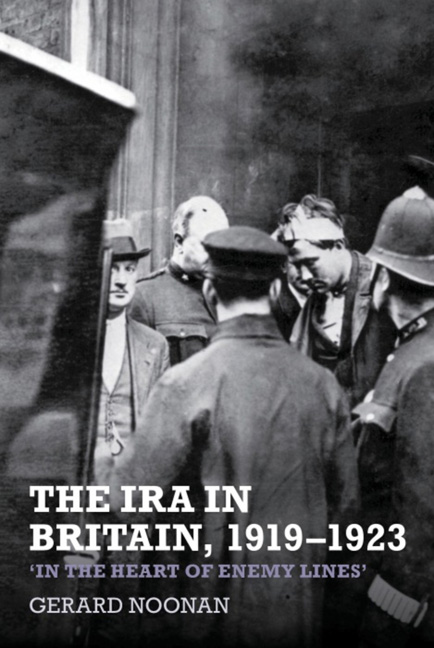Book contents
- Frontmatter
- Contents
- List of Illustrations
- List of Tables
- List of Graphs
- List of Abbreviations
- Acknowledgements
- Introduction
- Prologue
- 1 ‘On a Solid Footing’: Organizing Republicanism in Britain, January 1919–July 1921
- 2 Supplying an Army: Gunrunning in Britain, January 1919–July 1921
- 3 ‘We are doing what you are doing in Ireland’: IRA Operations in Britain, January 1919–July 1921
- 4 Truce, Treaty and Dissension, July 1921–June 1922
- 5 The Civil War, June 1922–May 1923
- 6 Combating the ‘Sinn Fein Movement’ in Britain: The Response of the Authorities, 1919–1923
- Epilogue and Conclusion
- Select Bibliography
- Index
Epilogue and Conclusion
- Frontmatter
- Contents
- List of Illustrations
- List of Tables
- List of Graphs
- List of Abbreviations
- Acknowledgements
- Introduction
- Prologue
- 1 ‘On a Solid Footing’: Organizing Republicanism in Britain, January 1919–July 1921
- 2 Supplying an Army: Gunrunning in Britain, January 1919–July 1921
- 3 ‘We are doing what you are doing in Ireland’: IRA Operations in Britain, January 1919–July 1921
- 4 Truce, Treaty and Dissension, July 1921–June 1922
- 5 The Civil War, June 1922–May 1923
- 6 Combating the ‘Sinn Fein Movement’ in Britain: The Response of the Authorities, 1919–1923
- Epilogue and Conclusion
- Select Bibliography
- Index
Summary
On 23 July 1924, Art O'Brien and Seán McGrath were released from Brixton prison, each having served just over one year of their two-year sentences for seditious conspiracy. Two months later, the ISDL held a reception to celebrate the event. After declaring that their trial had been ‘a farce’, O'Brien insisted that the treaty ‘would never bring peace between England and Ireland’. Denouncing the continued partition of Ireland, he stated that peace between the two countries could only be achieved by England getting out of Irish affairs.
By then, however, the ISDL was a mere shadow of its former self. The previous year, C.B. D utton, O'Brien's stand-in while he was in prison, had contacted 27 branches but received only one encouraging reply. The situation was ‘bad’, he wrote, and without funds for re-organization it was ‘practically hopeless’. In straitened circumstances, de Valera's republican government was unable to finance any re-organization. Moreover, the league's reputation had become rather tarnished. Evidence presented at the conspiracy trial had exposed O'Brien's comfortable circumstances. Recalling the ‘greatest difficulty’ he had encountered in receiving aid from the INA CDF in 1922, William Robinson balked at the revelation that the republican envoy was at the time ‘living in luxury at the Grosvenor Hotel, & receiving from the Republic £750 per annum plus £120 weekly for expenses!’ Moreover, in the witness box, O'Brien and McGrath had denied any association with the IRA, while the latter also criticized Countess Markievicz's communist politics. ‘This was done by avowed Republicans before the common enemy, in order to secure a mitigation of sentence!’ thundered a disgusted Robinson.
In December 1923, P.J. R utledge, de Valera's minister for foreign affairs, appointed Brian O'Hannigan as his representative in England. Two months later, a new republican body was founded: the Irish Freedom League of Great Britain. Its aims were ‘to assist in securing the Independence of the Irish Nation’ and to ‘support all organisations having for their object the furtherance of the Irish Language, Irish Pastimes, and Irish Industries; and any movement tending to strengthen Ireland's distinctive Nationality.’ Like the ISDL, membership was confined to people of Irish birth and descent and participation in British domestic politics was to be eschewed. O'Hannigan became president of the organization.
- Type
- Chapter
- Information
- The IRA in Britain, 1919–1923‘In the Heart of Enemy Lines’, pp. 320 - 328Publisher: Liverpool University PressPrint publication year: 2014



